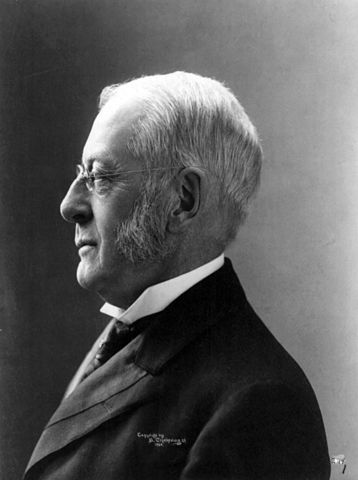
I return, with cries of delight, to Hell and the High Schools (1923), T. T. Martin’s unforgettably titled indictment of the teaching of evolution. In previous posts, I’ve discussed chapter 5, “Evolution Repudiated by Great Scientists and Scholars,” which consists, as is usual in creationist books of the Scopes era, of a hodgepodge of misquoted, misattributed, and misinterpreted passages, relieved only by the occasional expression of editorial opinion, aimed at disputing the claim that there is a scientific consensus on evolution. (See “Misquoting Murchison” for a discussion of Martin’s treatment of “Sir Roredick Murchison” and “The Three Balfours” for discussion of Martin’s treatment of Francis M. Balfour.) Now, however, I want to examine a passage from chapter 4, “Evolution is Not Science.”
Martin begins the chapter by commanding the reader to keep in mind the facts that “[t]his is not a fight between Evolutionists and the preachers”—because some preachers have “sold themselves to the devil” and some scientists are resisting the same influence—and that “[i]t is not a fight against science”—“The Bible and real science never conflict, for God is the God of both.” Rather, the fight is over whether evolution is science, and Martin proclaims, in italics, “Evolution is not science.” And he presents, as his first exhibit, the following testimony from Charles W. Eliot (1834–1926), who was indeed the president of Harvard University from 1869 to 1909.
Charles W. Elliott [sic], President Emeritus of Harvard University, recently was asked: “Is Cope’s statement that Evolution is the science of creation correct?” and he answered: “Evolution does not seem to me to be a science of creation or of anything else. It is merely a hypothesis.” (A guess.—T. T. M.) Again he was asked: “Is not Evolution a universal process, beginning in the organic world and flowing as a continuous stream through the ages, including all material and psychological changges [sic] that have taken place or will take place in the future?” He replied: “Evolution is a hypothesis (a guess—T. T. M.) and not a science at all.” Again he was asked: “Is Evolution to be regarded as a science or only as a theory?” He replied:, [sic] “Evolution is only a theory.”
“Cope” is the paleontologist Edward Drinker Cope (1840–1897), and “Evolution is the science of creation” is presumably from his The Primary Factors of Organic Evolution (1896), which defines evolution as holding “that creation has been and is accomplished by the agency of the energies which are intrinsic in the evolving matter, and without the interference of agencies which are external to it. … The science of evolution is the science of creation.” I have not been able to locate a definite source for the “universal process” question, although I suspect that it is a paraphrase of Herbert Spencer, who described evolution as “a universal process, one and continuous throughout all forms of existence.”
I have not been able to locate any source for the claim that Eliot was asked about Cope’s statement, although Martin also quotes a response from the president of Yale University, Arthur Twining Hadley (1856–1930), to the “universal process” question, suggesting that a questionnaire was sent to a group of university presidents. (Drop me a line if you have any idea about its provenance.) Without having the full text of the questions and answers, it’s hard to evaluate the significance of Eliot’s response. But, judging from a talk Eliot gave in 1913 at a Unitarian conference, he agreed, broadly, with Cope’s view that evolution can be regarded as creation: “The doctrine of evolution represents creation, whether of the heavenly bodies or of plants and animals, not as a piece of work done once for all by an infinite artificer in a short time…but as growing or gradually developing…”
It is possible, then, that what Martin welcomes as hostility toward evolution in Eliot’s response is merely a fastidious rejection of the idea that evolution is a science. There is a sense of “science”—sense 4b in the Oxford English Dictionary—on which a science is a branch of study. So understood, evolution is not a science—biology is a science; evolutionary biology is a science or at least a subdiscipline within a science; but evolution is a hypothesis or a theory (or perhaps it would be better to say a group of hypotheses, theories, models, etc.) within a science. That is compatible with the judgment that evolution is scientific, part of science, of course. And there’s no reason to suppose that Eliot—a chemist by training—would acquiesce in Martin’s tendentious glosses of “hypothesis” and “theory” as “guess”!
If Martin, writing in 1923, harbored any hope that Eliot—a towering figure in American higher education even then, fourteen years after his retirement as the president of Harvard University—could be enlisted in the crusade against the teaching of evolution, he was already doomed to disappointment. In 1922, in a telegram to the president of the University of Kentucky, then leading opposition to the first antievolution bill introduced in a state legislature in the United States, Eliot exclaimed, “Cannot believe that any American legislature can be induced to prohibit the teaching in public schools of evolution or any other scientific hypothesis of proven value.” And a few years later, he would join the Tennessee Evolution Case Fund advisory committee to raise money for the legal defense of John Thomas Scopes.

